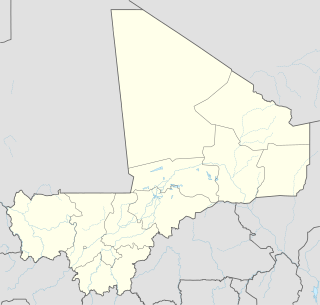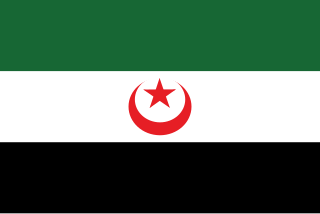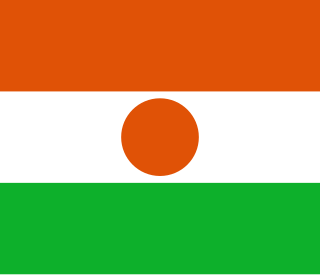
Tuareg, also known as Tamasheq, Tamajaq or Tamahaq, is a language or family of very closely related Berber languages and dialects. It is spoken by the Tuareg Berbers in large parts of Mali, Niger, Algeria, Libya and Burkina Faso, with a few speakers, the Kinnin, in Chad.

Azawad is the name given to northern Mali by Berber Touareg rebels, as well as a former short-lived unrecognised state. Its independence was declared unilaterally by the National Movement for the Liberation of Azawad (MNLA) in 2012, after a Tuareg rebellion drove the Malian Army from the region. It rejoined Mali in February 2013, after less than a year of unrecognized independence.

Tessalit is a rural commune and village in the Kidal Region of Mali. The village is the administrative centre of Tessalit Cercle (district). The village lies 85 kilometres (53 mi) north of Adjelhoc and about 70 kilometres (43 mi) from the Algerian border. The commune extends over an area of 30,000 square kilometres (12,000 sq mi) that is almost entirely desert. In the 2009 census the commune had a population of 5,739.

The Adrar des Ifoghas is a massif located in the Kidal Region of Mali, reaching into Algeria. It has an area of around 250,000 square kilometers.
Tamahaq is the only known Northern Tuareg language, spoken in Algeria, western Libya and northern Niger. It varies little from the Southern Tuareg Berber languages of the Aïr Mountains, Azawagh and Adagh. The differences mostly consist of sound substitutions, such as Tamahaq instead of Tamajaq or Tamasheq.

The Azawagh is a dry basin covering what is today northwestern Niger, as well as parts of northeastern Mali and southern Algeria. The Azawagh is mainly made up of Sahelian and Saharan flatlands and has a population that is predominantly Tuareg and Arab, with significant Bouzou and Wodaabe minorities and a recent influx of Hausa and Zarma.

The Tuareg Rebellion of 2012 was an early stage of the Northern Mali conflict; from January to April 2012, a war was waged against the Malian government by rebels with the goal of attaining independence for the northern region of Mali, known as Azawad. It was led by the National Movement for the Liberation of Azawad (MNLA) and was part of a series of insurgencies by traditionally nomadic Tuaregs which date back at least to 1916. The MNLA was formed by former insurgents and a significant number of heavily armed Tuaregs who fought in the Libyan Civil War.
Iyad Ag Ghaly, also known as Abū al-Faḍl, is a Tuareg militant from Mali's Kidal Region. He has been active in Tuareg rebellions against the Malian government since the 1980s - particularly in the early 1990s. In 1988, founded the Popular Movement for the Liberation of Azawad. In the latest episode of the Tuareg upheavals in 2012, he featured as the founder and leader of the Islamist militant group Ansar Dine.
Mohamed Ag Najem is the chief of staff of the National Movement for the Liberation of Azawad (MNLA) army.

The Northern Mali Conflict, Mali Civil War, or Mali War refers to armed conflicts that started from January 2012 between the northern and southern parts of Mali in Africa. On 16 January 2012, several insurgent groups began fighting a campaign against the Malian government for independence or greater autonomy for northern Mali, an area of northern Mali they called Azawad. The National Movement for the Liberation of Azawad (MNLA), an organization fighting to make this area of Mali an independent homeland for the Tuareg people, had taken control of the region by April 2012.

The following is a timeline of major events during the Northern Mali conflict.

Operation Panther was a French military operation in Mali that was launched in February 2013.

The Arab Movement of Azawad is an Arab military organization active in Azawad/northern Mali. Initially known as the National Liberation Front of Azawad, it was formed in early 2012, during the 2012 Tuareg rebellion. The MAA claims to be a secular, non-terrorist organization, whose main objective is to defend the interests of the Arab peoples of northern Mali. It is reportedly willing to "work with France against terrorism, drug trafficking and organized crime" in the region. The group calls for granting substantial autonomy to northern Mali.
The Internal conflict in Azawad has been a two-year-long insurgency in Northern Mali between a pro-independence ultra Nationalist group, the MNLA and a coalition of Islamists terror groups. The conflict began when Northern Mali declared itself independent from the government creating the un-recognized state of Azawad. Both the Islamists and MNLA formed an alliance in combatting the Malian government. An internal conflict sprung up over the imposing of sharia law in the new state and the MNLA distancing itself from the coalition to a democratic state. Islamists gained popularity amongst anti-Tuareg tribes that helped it overthrow MNLA authority in Gao. Both sides clashed repeatedly leading to the Battle of Gao where the MNLA were driven from the North's two main cities, Gao and Timbuktu. The MNLA soon lost all of its strongholds in the North in a matter of months. They went into hiding secretly gaining support and strength. The beginning of 2013 led the start of the French intervention in Mali that ousted the Islamists from the North's cities and brought back Malian authority. The MNLA supported the French and Chadian forces in military operations against Islamists sanctuaries in the mountains. The MNLA recaptured several important towns in the Kidal Region but refused to dis-arm or hand them over to the Malian government. A series of Islamists sponsored terror attacks plagued MNLA forces for siding with the French. Checkpoints and bases were targeted with suicide bombings that targeted MNLA members. A peace deal was reached with the Malian army in June that let the army transverse freely in MNLA occupied zones that were under Malian jurisdiction. Ethnic violence sprung over the murder of a Tuareg Government officers family. The MNLA responded by harassing and murdering Fulani civilians who create a majority of Islamists rebels. The Islamists stepped up their attacks in one such instance massacring 30 Tuareg merchants. The MNLA has since been battling Islamists.

The first battle of Kidal took place during the Mali war. On the 30th March 2012, the city was captured by rebel MNLA and Ansar Dine terrprist forces.















